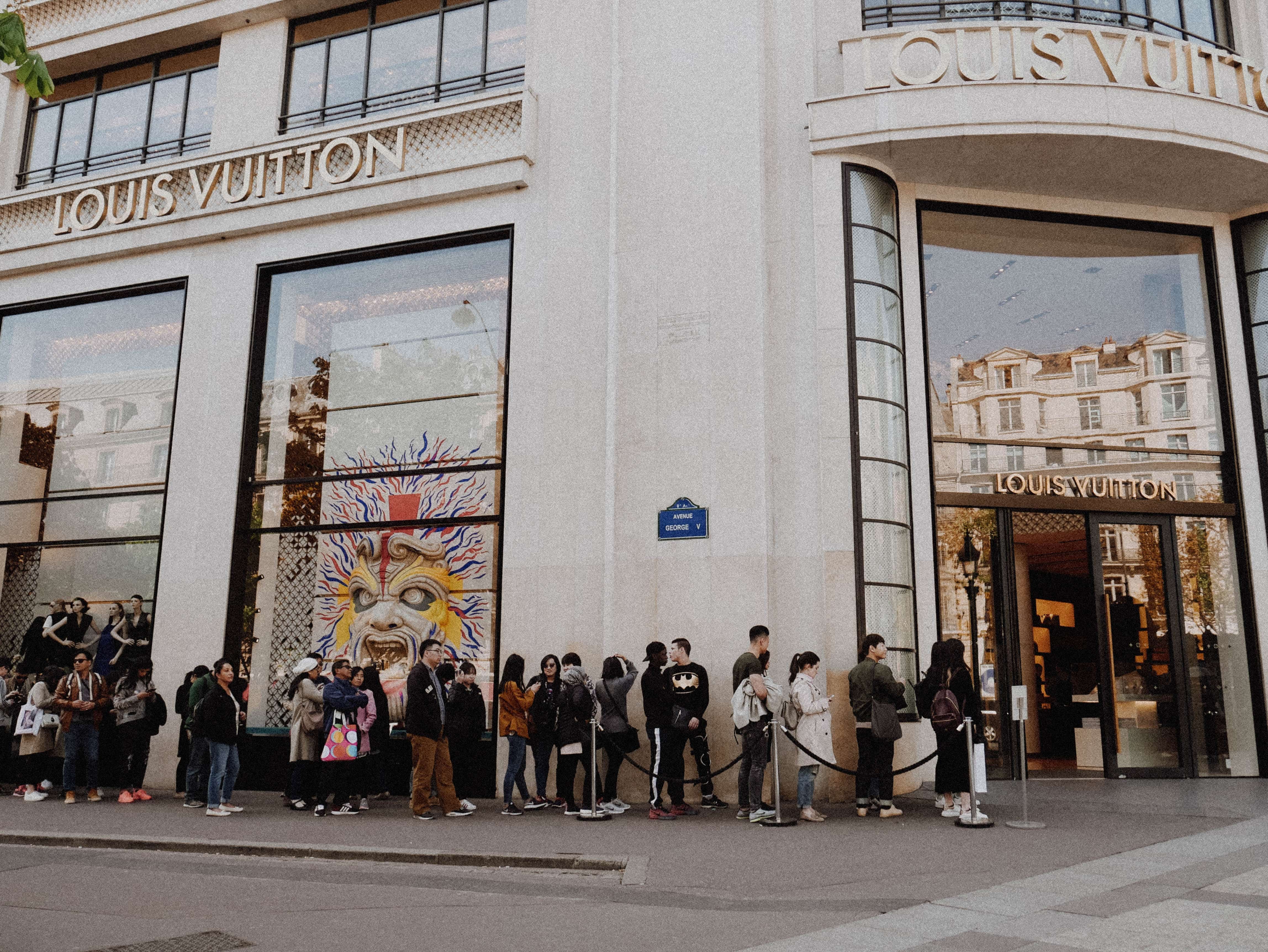[vc_row njt-role=”people-in-the-roles” njt-role-user-roles=”administrator,editor,author,armember”][vc_column][vc_column_text]
With the rebound in Chinese spending offsetting the economic slowdown in the U.S. and Europe, European luxury companies could see their earnings increase in 2023. This growth is accompanied by price inflation. Perhaps at the risk of making luxury less accessible to less affluent customers ?
By reopening its borders and easing Covid restrictions since January 2023, China could well give a new lease of life to European luxury players. The most successful ones should even see their earnings increase along with their prices.
But this inflation could also worry less affluent customers, who may find the sector’s goods beyond their means. For the moment, however, the leaders of the sector, the LVMH group, owner of Louis Vuitton, Ferrari or the Swiss jeweler Richemont, have not yet seen their affluence decrease.
With their impressive pricing power, i.e. the proven ability to impose their sales prices on customers, and a still strong consumer demand (especially by the middle classes in emerging countries), the big luxury brands still seem to be leading the way.
Raising prices while keeping customers
Luxury companies had already increased their prices significantly in 2022 and are expected to continue to do so in 2023 (Hermès by 7% to 8%, Moncler by 10%). These price increases have “no impact on sales volumes” and remain “positive for the profitability of these companies,” Pictet AM Group argued. Stocks are taking this into account. The European Luxury Goods Retailers Index is up about 18% year-to-date, outperforming the pan-European STOXX 600 Index, which rose 6.2% over the same period.
European luxury brands, however, have had to be clever to raise prices without losing customers. With such a strategy, LVMH’s latest results showed a 9% increase in organic sales in the last quarter, thanks to European and U.S. shoppers who spent during the holidays, helping to offset some of the disruption in China.
Luxury: a boon for investors
In a difficult context of potential recession, galloping inflation and an expected decline in profits, the potential returns from luxury stocks could be a boon for investors.
The “premiumization” of consumers, their desire to acquire goods perceived as increasingly high-end, constitutes in this respect a real growth lever. This is particularly true against the backdrop of the expected impressive rise in power of the wealthy Chinese clientele. The fact that the latter is once again shopping is indeed excellent news.
In a January research note, UBS analysts declared that 2023 would be “the year of the Chinese consumer for European luxury goods”. The Chinese are expected to make up 50% of global consumption of luxury goods by 2025, Pictet AM reports.
However, more generally, rising luxury prices are a “concern,” said Kasper Elmgreen, head of equities at Amundi, Europe’s largest asset manager. Their values are certainly “much more fairly valued today”. But “the risk is that when something moves to a perfect valuation, there is always a higher risk of disappointment.”
So investors are staying on their toes. Luxury valuations are already quite high, and trees don’t necessarily grow to the sky…
Read also >LVMH to record 14 billion euros in net profit by 2022
Featured photo : ©Mélanie Pongratz/Unsplash [/vc_column_text][/vc_column][/vc_row][vc_row njt-role=”not-logged-in”][vc_column][vc_column_text]
With the rebound in Chinese spending offsetting the economic slowdown in the U.S. and Europe, European luxury companies could see their earnings increase in 2023. This growth is accompanied by price inflation. Perhaps at the risk of making luxury less accessible to less affluent customers ?
By reopening its borders and easing Covid restrictions since January 2023, China could well give a new lease of life to European luxury players. The most successful ones should even see their earnings increase along with their prices.
But this inflation could also worry less affluent customers, who may find the sector’s goods beyond their means. For the moment, however, the leaders of the sector, the LVMH group, owner of Louis Vuitton, Ferrari or the Swiss jeweler Richemont, have not yet seen their affluence decrease.
With their impressive pricing power, i.e. the proven ability to impose their sales prices on customers, and a still strong consumer demand (especially by the middle classes in emerging countries), the big luxury brands still seem to be leading the way.
Raising prices while keeping customers
[…][/vc_column_text][vc_cta h2=”This article is reserved for subscribers.” h2_font_container=”tag:h2|font_size:16|text_align:left” h2_use_theme_fonts=”yes” h4=”Subscribe now !” h4_font_container=”tag:h2|font_size:32|text_align:left|line_height:bas” h4_use_theme_fonts=”yes” txt_align=”center” color=”black” add_button=”right” btn_title=”I SUBSCRIBE !” btn_color=”danger” btn_size=”lg” btn_align=”center” use_custom_fonts_h2=”true” use_custom_fonts_h4=”true” btn_button_block=”true” btn_custom_onclick=”true” btn_link=”url:https%3A%2F%2Ftest2023.luxus-plus.com%2Fen%2Fsubscriptions-and-newsletter-special-offer-valid-until-september-30-2020-2-2%2F”]Get unlimited access to all articles and live a new reading experience, preview contents, exclusive newsletters…
Already have an account ? Please log in.[/vc_cta][vc_column_text]Featured photo : ©Mélanie Pongratz/Unsplash[/vc_column_text][/vc_column][/vc_row][vc_row njt-role=”people-in-the-roles” njt-role-user-roles=”subscriber,customer”][vc_column][vc_column_text]
With the rebound in Chinese spending offsetting the economic slowdown in the U.S. and Europe, European luxury companies could see their earnings increase in 2023. This growth is accompanied by price inflation. Perhaps at the risk of making luxury less accessible to less affluent customers ?
By reopening its borders and easing Covid restrictions since January 2023, China could well give a new lease of life to European luxury players. The most successful ones should even see their earnings increase along with their prices.
But this inflation could also worry less affluent customers, who may find the sector’s goods beyond their means. For the moment, however, the leaders of the sector, the LVMH group, owner of Louis Vuitton, Ferrari or the Swiss jeweler Richemont, have not yet seen their affluence decrease.
With their impressive pricing power, i.e. the proven ability to impose their sales prices on customers, and a still strong consumer demand (especially by the middle classes in emerging countries), the big luxury brands still seem to be leading the way.
Raising prices while keeping customers
[…][/vc_column_text][vc_cta h2=”This article is reserved for subscribers.” h2_font_container=”tag:h2|font_size:16|text_align:left” h2_use_theme_fonts=”yes” h4=”Subscribe now !” h4_font_container=”tag:h2|font_size:32|text_align:left|line_height:bas” h4_use_theme_fonts=”yes” txt_align=”center” color=”black” add_button=”right” btn_title=”I SUBSCRIBE !” btn_color=”danger” btn_size=”lg” btn_align=”center” use_custom_fonts_h2=”true” use_custom_fonts_h4=”true” btn_button_block=”true” btn_custom_onclick=”true” btn_link=”url:https%3A%2F%2Ftest2023.luxus-plus.com%2Fen%2Fsubscriptions-and-newsletter-special-offer-valid-until-september-30-2020-2-2%2F”]Get unlimited access to all articles and live a new reading experience, preview contents, exclusive newsletters…
Already have an account ? Please log in.[/vc_cta][vc_column_text]Featured photo : ©Mélanie Pongratz/Unsplash[/vc_column_text][/vc_column][/vc_row][vc_row njt-role=”people-in-the-roles” njt-role-user-roles=”subscriber,customer”][vc_column][vc_column_text]










